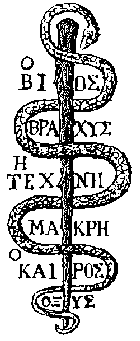College of St. Cosmas
School of Medicine
Medicine in Ancient and Medieval Times
| Barber-Surgeons |
 Caduces |
| Chronological Table | |
| Medical Library | |
| References (links to related sources on the Net) |
| Barber-Surgeons |
 Caduces |
| Chronological Table | |
| Medical Library | |
| References (links to related sources on the Net) |
Through the Renaissance, both men and women practiced medicine. (From about the beginning of the 17th century through the early 20th century, women were either excluded or banished to such roles as attendant, assistant or nurse.)
There were medical people for the rich and the poor although money and power brought higher quality care. Many of the advances in medicine followed advances not only in science and technology, but in warfare. Battle was a major source for injury and death. Illness (and death) generally came from lack of sanitation in personal, home and food cleanliness.
The Ancient Greeks seemed to be the source of most medical knowledge up through and including the time of the Roman Empire. Most of Rome's best-known physicians were actually Greek. Upon the splitting and ultimate collapse of the Empire, that knowledge (along with so much other information) was left to the Eastern Empire or in the vaults of the Roman Catholic Church.
As the great cities of the east were sacked (by Saracens, Persians, Turks, etc.), the libraries were either destroyed or the books were taken away. In the west, the monks jealously guarded the "church's secrets" and themselves handled much of the local medical needs during the "Dark Ages".
When books from the ancient libraries finally made it to Western Europe, and explorers from Europe rounded the southern tip of Africa and made contact with others in the possession of Middle Eastern peoples, medicine as well as many other fields flourished in the Renaissance.
| Originally created 15 May 1997 by |